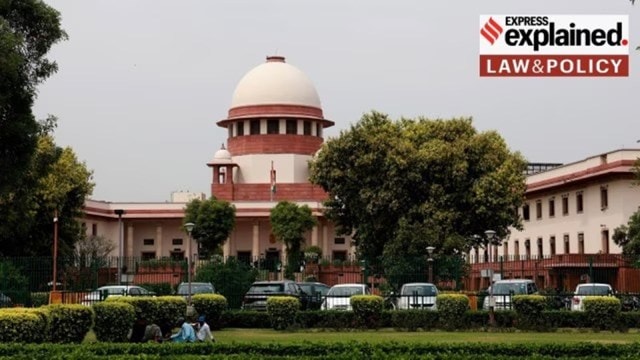SC clarifies Governor’s powers: How it answered 14 questions referred by President
Supreme Court Governor powers, SC on Bill assent: The Supreme Court verdict addresses 14 specific questions of law referred to the court by President Droupadi Murmu. Here's a breakdown of each.
 Supreme Court Governor powers: The SC ruled that there is no option to "withhold assent simpliciter" — the Governor cannot simply refuse to sign a Bill and keep it pending. (File)
Supreme Court Governor powers: The SC ruled that there is no option to "withhold assent simpliciter" — the Governor cannot simply refuse to sign a Bill and keep it pending. (File)Supreme Court Governor powers: In a significant verdict settling the law about the legislative interaction between Governors and state governments, a five-judge Constitution Bench of the Supreme Court today delivered its opinion on the Presidential Reference regarding the assent to Bills by the Governor.
The opinion, delivered days before Chief Justice of India BR Gavai’s retirement, addresses 14 specific questions of law referred to the court by President Droupadi Murmu.
While the court ruled that Governors cannot sit on Bills indefinitely, it also held that the judiciary cannot impose rigid timelines on constitutional authorities.
Here is a breakdown of the 14 questions referred to the court and its answers:
What are the constitutional options before a Governor when a Bill is presented to him under Article 200?
Article 200 of the Constitution outlines the process for a Governor to give assent to a Bill passed by the state legislature. The Court held that the Governor has three specific options: to grant assent, to reserve the Bill for the President’s consideration or to withhold assent and return the Bill to the legislature with comments for reconsideration.
Crucially, the Court ruled that there is no option to “withhold assent simpliciter” — the Governor cannot simply refuse to sign a Bill and keep it pending; if they withhold assent, they must return the Bill to the House.
Is the Governor bound by the aid and advice of the Council of Ministers while exercising options under Article 200?
No. Article 163 of the Constitution states that the Governor must act on the aid and advice of the Council of Ministers, except where the Constitution requires them to exercise discretion. The court ruled that in the specific function of granting assent to Bills, the Governor enjoys discretion and is not bound by the Cabinet’s advice. The Bench reasoned that if Governors were bound by the Cabinet, they could never return a Bill for reconsideration, as no government would advise against its own legislation.
Is the exercise of constitutional discretion by the Governor under Article 200 justiciable?
The substantive decision or the merits of why a Governor took a certain step is not justiciable — that is, courts cannot review the wisdom of the decision. However, the Supreme Court ruled that “prolonged, unexplained, and indefinite inaction” is subject to judicial review. If a Governor sits on a Bill without taking any decision, the court can direct them to act.
Is Article 361 an absolute bar to judicial review in relation to the actions of a Governor under Article 200?
No. Article 361 grants the President and Governors personal immunity, stating they are not “answerable to any court” for the performance of their duties. The court held that while this protects the individual, it does not protect the “office” of the Governor from judicial scrutiny regarding constitutional inaction. The immunity cannot be used to shield indefinite delays.
Can timelines be imposed on the Governor through judicial orders for the exercise of powers under Article 200?
No. The Court overruled its judgment from April which had set specific timelines of one to three months to act on the Bill. It held that since Article 200 uses the elastic phrase “as soon as possible” rather than a fixed timeframe, it would be inappropriate for the judiciary to prescribe rigid deadlines.
Is the exercise of constitutional discretion by the President under Article 201 justiciable?
No. Article 201 deals with Bills reserved by the Governor for the President’s consideration. Similar to the Governor, the President’s decision to assent or withhold assent to a state Bill is not open to judicial review on its merits.
Can timelines be imposed on the President for the exercise of discretion under Article 201?
No. The President cannot be bound by judicially prescribed timelines when dealing with state Bills reserved for their consideration.
Is the President required to seek the advice of the Supreme Court under Article 143 when a Governor reserves a Bill?
No. Article 143 allows the President to consult the Supreme Court on questions of law. The Court clarified that the President is not required to seek this opinion every time a Bill is reserved. The President’s subjective satisfaction is sufficient.
Are decisions of the Governor/President justiciable at a stage anterior to the law coming into force? Can courts adjudicate the contents of a Bill?
No. The Court ruled that judicial review applies only to “laws”, that is, enacted legislation, not “Bills”, which are proposed legislation. Courts cannot adjudicate on the validity of a Bill before it receives assent and becomes law.
Can the exercise of constitutional powers by the President/Governor be substituted under Article 142?
No. Article 142 grants the Supreme Court the power to pass any order necessary to do “complete justice.” The Court firmly rejected the concept of “deemed assent” – that is, assuming a Bill is passed if delayed – introduced by a two-judge bench in the April 2025 verdict. It held that Article 142 cannot be used to create a legal fiction that substitutes the Governor’s constitutional role.
Is a law made by the state legislature a law in force without the assent of the Governor?
No. A Bill cannot become a law without the specific assent of the Governor – or President, if reserved.
Is it mandatory for any Bench of the court to first decide whether the issues before it involve substantial questions of law that must be referred to a five-judge Bench under Article 145(3)?
The Court declined to answer this question. Article 145(3) mandates that cases involving substantial interpretation of the Constitution be heard by at least five judges. The Court stated this query was irrelevant to the functional nature of the reference regarding legislative assent.
Is the power of the Supreme Court under Article 142 limited to procedural law or does it extend to issuing directions/passing orders which are contrary to or inconsistent with existing substantive or procedural provisions of the Constitution or any law in force?
The Court found this question too broad to answer definitively but clarified that, as per its response to Question 10, that Article 142 cannot be used to override substantive constitutional provisions like the requirement of assent.
Does the Constitution bar any other jurisdiction of the Supreme Court to resolve disputes between the Union and States except under Article 131?
The Court declined to answer this question. Article 131 gives the Supreme Court original jurisdiction over disputes between the Centre and States. The Bench deemed this irrelevant to the specific issues regarding the Governor’s powers.
- 01
- 02
- 03
- 04
- 05






































